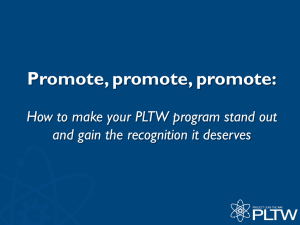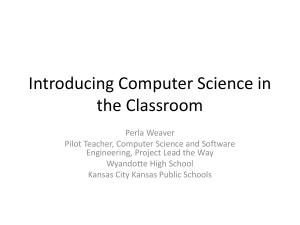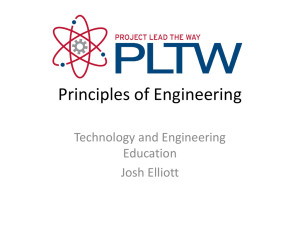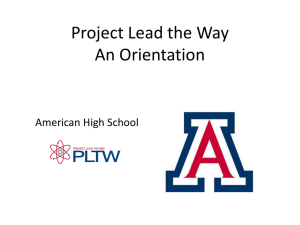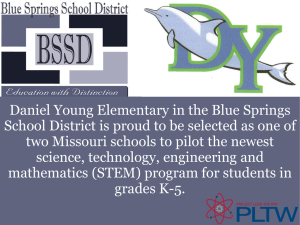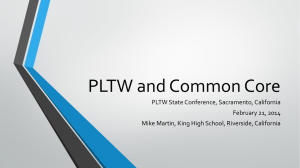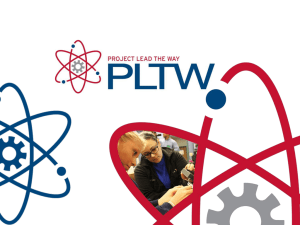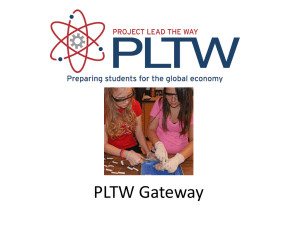Project Lead the Way Rendee - Santa Clara County Office of
advertisement
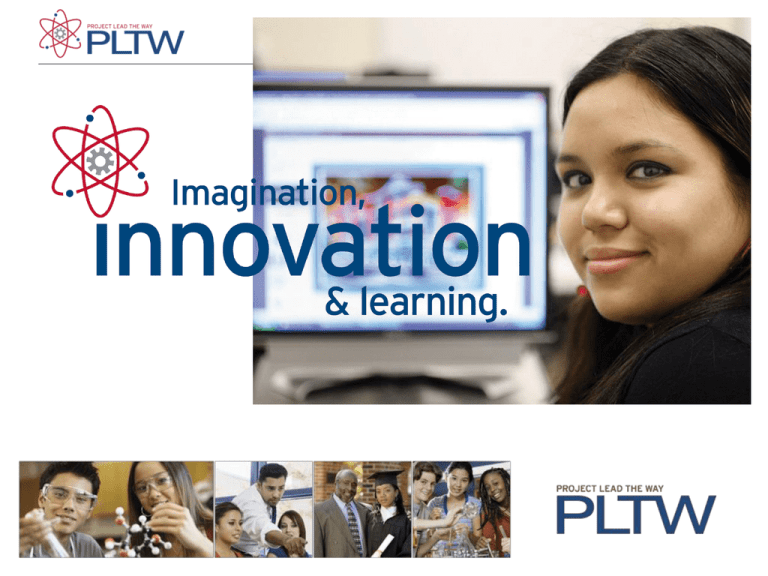
Overview Project Lead the Way (PLTW) is reenergizing STEM education at middle schools and high schools throughout the country, providing students with 21st century skills. Innovation Zone = The PLTW Innovation Zone (aka the classroom) is an engaging and thoughtprovoking space, where students develop critical thinking skills through hands-on project-based learning, preparing them to take on real-world challenges. Innovation Zone Innovation Zone Characteristics • Cutting-edge technology, equipment and materials • Collaboration • Problem-solving rather than lectures • Relevant subject matter • Invested teachers • A-G Approved Innovation Zone Innovation Zones Are Idea Factories • Discovering a new “patented” biofuel process • Designing alternate housing projects • Testing cutting edge wind turbines • Programming robotics • Conducting DNA gel electrophoresis. September 29, 2011 Engineering Pathways to Success Rendee Dore’ PLTW Regional Center Coordinator San Jose State University College of Engineering Engineering Pathways to Success Initiative • Not enough U.S./California talent to fill engineering needs and fuel innovation engine • Not enough students are exposed to engineering in high school • Students not motivated/not prepared to study engineering Engineering Pathways to Success • A partnership between San Jose State University, the corporate sector, and schools and districts • Produce more “home-grown” engineers to drive innovation economy • There are 325,000 public high school students in 11county Bay Area • 50% are underrepresented minorities (non-white, non-Asian) • Increase the number, diversity and preparedness of students in the 11county Bay Area who enter and successfully complete baccalaureate engineering programs • Improve and activate integrated pathways from middle school to college graduation with engineering degrees PLTW California State University Regional Centers San Jose State University , Dr. Emily Allen, Associate Dean, College of Engineering Cal Poly Pomona, Dr. Cordelia Ontiveros, Associate Dean, College of Engineering Cal State East Bay, Dr. Oscar Wambuguh, Professor Biomedical San Diego State University, Dr. Bruce Westermo, Associate Dean, College of Engineering Cal Poly San Luis Obispo, Stacey Breitenbach, Assistant Dean, College of Engineering Cal State San Bernardino, Dr. Joseph Scarcella, Professor of Education Cal State Chico , Teresita Curiel, College of Engineering, Computer Science & Construction Management Cal State Bakersfield Inclusivity • Strong partnerships with colleges, corporations and philanthropic organizations ensure coursework is relevant and classes are equipped with up to date technology and equipment • PLTW Program support • A sustainable curriculum • The program is continually energized with new talent and fresh thinking Middle School Gateway To Technology Gateway To Technology MS • Design and Modeling – Solid modeling software introduces students to the design process. • Automation and Robotics – Students trace the history, development, and influence of automation and robotics. • Energy and the Environment – Students investigate the importance of energy in our lives and the impact that using energy has on the environment. • Flight and Space – Aeronautics, propulsion, and rocketry. • Science of Technology – Impact of science on technology throughout history. • Magic of Electrons – Students unravel the mystery of digital circuitry. High School Pathway To Engineering Pathway To Engineering HS • Introduction to Engineering Design (IED) – 3D computer modeling software; study of the design process • Principles of Engineering (POE) – Exploration of technology systems and engineering processes • Digital Electronics (DE) – Use of computer simulation to learn the logic of electronics Pathway To Engineering HS • Aerospace Engineering (AE) – Aerodynamics, astronautics, space-life sciences, and systems engineering • Biotechnical Engineering (BE) – Biomechanics, genetic engineering, and forensics. • Civil Engineering and Architecture (CEA) – Students collaborate on the development of community-based building projects • Computer Integrated Manufacturing (CIM) – Robotics and automated manufacturing; production of 3-D designs. • Engineering Design and Development (EDD) – Teams of students, guided by community mentors, research, design, and construct solutions to engineering problems. High School Biomedical Sciences Biomedical Sciences HS • Principles of the Biomedical Sciences (PBS) – Study of human body systems and health conditions • Human Body Systems (HBS) – Exploring science in action, students build organs and tissues on a skeletal manikin and play the role of biomedical professionals to solve medical mysteries. • Medical Interventions (MI) – Investigation of interventions involved in the prevention, diagnosis and treatment of disease. • Biomedical Innovation (BI) – Students design innovative solutions for the health challenges of the 21st century Program Approval for UC/CSU Requirements • D approval – Engineering Research and Development • F approval – Introduction to Design • G approval – – – – – – – – Introduction to Engineering Design Principles of Engineering Digital Electronics Aerospace Engineering Civil Engineering/ Architecture Computer Integrated Manufacturing Biotech Engineering Engineering Design and Development PLTW Growth in California Schools Over 300 Schools 300 230 Schools 250 200 160 Schools 150 100 50 5 Schools 0 2000 2001 2002 2003 2004 2005 2006 2007 2008 2009 2010 2011 PLTW Growth in Bay Area Schools 80 70 60 50 40 30 37 Schools 23 Schools 20 10 3 Schools 3 Schools 7 Schools 0 2007 2008 2009 2010 2011 2012 2013 2014 2015 Ethnic demographics for comparison to Bay Area PLTW classes 45% African American Asian 40% Hispanic/ Latino 35% 30% 25% 20% 15% 10% 5% 0% % of US Population % of California Population % of Santa Clara County % of Total PLTW Sample % of US Engineering Professionals Gender demographics for comparison to Bay Area PLTW classes 90% 80% Male Female 70% 60% 50% 40% 30% 20% 10% 0% % of US Population % of California Population % of Santa Clara County % of Total PLTW Sample % of US Engineering Professionals Bay Area PLTW Schools: 2010-11 School Site American High School Dublin High School James Logan High School Livermore High School Oakland High School Antioch High School Clayton Valley High School Mount Diablo High School California High School Richmond High School George Washington High School Burton High School Westmont High School Independence High School Gunn High School Bret Harte Middle School Burnett Middle School Leland High School San Jose High Academy Valley Christian Junior High Vallejo High School Alisal High School Watsonville High School School District Freemont Unified Dublin Unified New Haven Unified Livermore Valley Joint Unified Oakland Unified Antioch Unified Mount Diablo Unified San Ramon Valley Unified West Contra Costa Unified San Francisco Unified Campbell Union East Side Union Palo Alto Unified San Jose Unified Private School Vallejo City Unified Salinas Union Pajaro Valley Unified County Alameda Contra Costa San Francisco Santa Clara Solano Monterey New Bay Area PLTW Schools: 2011-12 School Site Christensen Middle School School District County Livermore Valley Joint Unified East Avenue Middle School Livermore Valley Joint Unified Fallon Middle School Dublin Unified Concord High School Mount Diablo Unified Northgate High School Mount Diablo Unified Riverview Middle School Mount Diablo Unified Pinole Valley High School West Contra Costa Unified Helms Middle School West Contra Costa Unified Woodside High School Sequoia Union San Mateo Fremont High School Fremont Union High School Santa Clara Yerba Buena High School East Side Union Valley Christian High School Private Fairfield High School Fairfield –Suisun Unified Solano Middle School Vallejo City Unified Contra Costa Solano Upcoming PLTW Events • October 7, 2011 PLTW General Counselor Workshop • January 5, 2012 PLTW Showcase, Intro. to PLTW Meeting • April PLTW Competition • May: Best Practices for PLTW Fall 2012 Implementers • June 17 – 29 SJSU Center PLTW Summer Teacher Institute • During the year – Ad hoc PLTW instructor meetings ARUBA Networks Inclusivity The Facts • 350,000 students in more than 4,000 schools in all 50 states and the District of Columbia • Over 13,000 teachers trained • More than 100 University relationships, including Duke University, University of Minnesota, California State University • Partnerships with Fortune 100 and 500 companies, and forward-thinking philanthropic organizations, including Autodesk, Intel, General Electric and Kern Family Foundation PLTW DELIVERS RESULTS Better results in college 97% of participating seniors intend to pursue a 4-year degree or higher (vs. 67% nationally) 90% of PLTW alumni have higher retention rates in college STEM programs Increases participation in STEM majors 95% HS seniors say they are preparing for STEM jobs 57% intend to attend graduate school 80% plan to study engineering, technology or computer science in college 5 times more likely to graduate from college in STEM majors Summary Join Us In Helping To Lead The Way • Vision: To ignite the spark of ingenuity, creativity and imagination within students • Helping America and Silicon Valley succeed in the increasingly high-tech and high-skill global economy • Develop STEM pathways in SV schools • Visit www.pltw.org or www.pltwca.org (CA) to learn more Local PLTW Programs: John Denevan San Jose High School PLTW Program Coordinator PLTW San Jose Unified School District Delegate Steve Motter Burnett Middle School GTT Instructor

